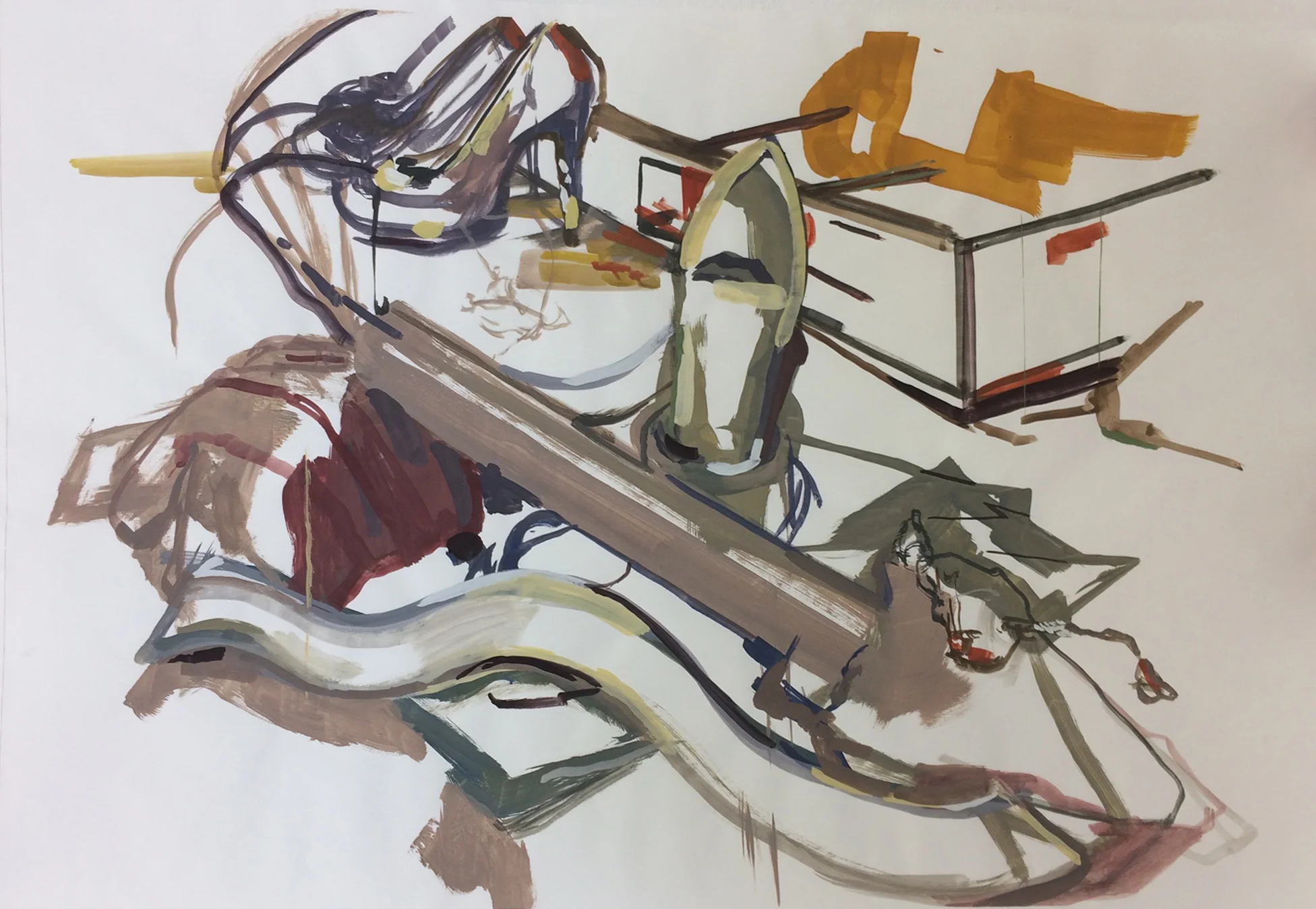














Flare, Ruskin Gallery, Cambridge School of Art
Book of Love 14metre, book of gouache paintings and mono prints
5 Oil Paintings on panel

I want my artwork to welcome the viewer’s criticism and consideration. I aim to make my work more accessible to new audiences through its format and presentation. In order to do this for my most recent body of work I changed the format and physical orientation of my paintings from being solely on the wall, to a more considered installation combining vertical paintings on the wall with paintings on the floor below. In the degree show Flare, this installation limited the distance between my painting ‘Window’ and the viewer. The ‘Book of Love’ was installed on the floor directly below it, causing the viewer to have to look up and down, and side to side to view each piece. The effect being that the viewer could not look at just one image at a time.
In his essay The Flatbed Picture Plane, Leo Steinberg (1972) described the picture plane as, “a pictorial surface whose angulation with respect to human posture is the precondition of its changed content”. Steinberg was influenced by the paintings made by Robert Rauschenberg in the 1960’s, which referred to horizontal planes, surfaces that we work, sit and sleep on, as opposed to vertical planes that reflect human posture. Rauschenberg’s work changed how we see the picture plane, and reflected a shift in how artists see, and depict the world (Steinberg, 1972).
I have altered how I perceive my own work and found it useful to look at it in terms of everyday technological practices used to make and disseminate the work, interfaces, sources from which I gain the imagery and then make work from. I am striving to make work that is more reflective of our everyday culture.
Helen Johnson had a large exhibition of her paintings at the ICA in March 2017, Warm Ties, which influenced my thinking on format and display. The paintings were displayed down the centre of the room, loose canvas hanging from the ceiling, hung in a zig-zag formation, so some of the pieces could be viewed in a more enclosed space, and the viewer was able to fully inspect the back of the canvases also. Looking at Johnson’s work made me reconsider the way I install my paintings on panel and has sparked an interest in trying canvas as a surface in the future.
I found making the ‘Book of Love’ in November 2016 to be pivotal in instigating many of the format and installation changes I have made to the presentation of my painting practice in this September’s degree show Flare. Using the book as a container to house private and personal paintings and allowing them to be viewed through the unfolding of the book, forced me to expose the fragility of my personal work and to trust the viewer to care for the life, my life, that was depicted on it’s pages. This created a new relationship between the viewer and myself.
The emphasis on the display of my paintings has been very important and I have been researching how different contemporary painters approach this. Jutta Koether, is a painter who has been labelled as making ‘transitive paintings’ or paintings that enter into a network. David Joselit states in his essay Painting Beside Itself, 2009, “Koether approaches the problem in a different way. Instead of attempting to visualize the overall contours of a network, she actualizes the behavior of objects within networks by demonstrating what I would like to call their transitivity.” (p129, Myers). Her paintings must be installed in a very specific way in order to allow for the viewers positioning in front of it, and to allow for a performance to take place near it. ‘Hot Rod (After Poussin)’ 2009, is a painting Koether made for her solo show at Reena Spaulings in New York. The gallery floor was partly removed for this one painting on canvas, a wall was built in the centre of the space; one foot of the wall was on the gallery floor and another on the cement floor, giving the wall that was holding the painting, an unstable feeling and allowing Koether, when she performed near it, to step onto a stage. Koether performed a series of theatrical readings of poetry in front of this piece. The idea is the work will always be circulating if it is connected to other things, and events, as Joselit explains “..for Koether “painting” functions as the nodal point of performance, installation, a figurative style of gestural re-enactment on canvas.” (p220, Myers). This act of entering a painting into a network, keeps it from becoming completely concrete, commoditized, immobilised.